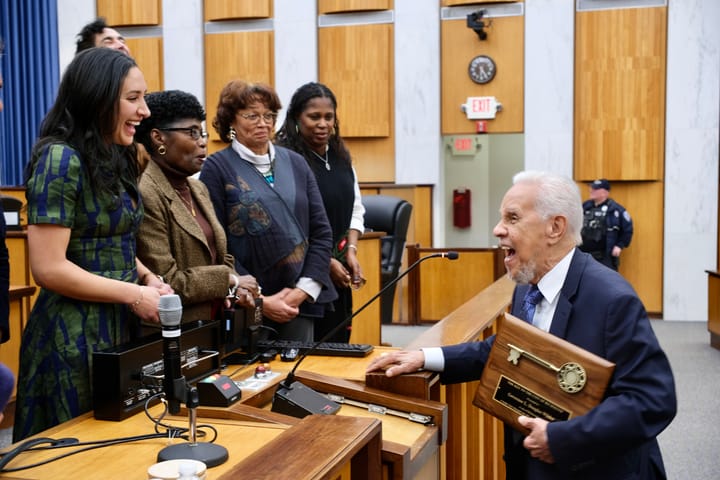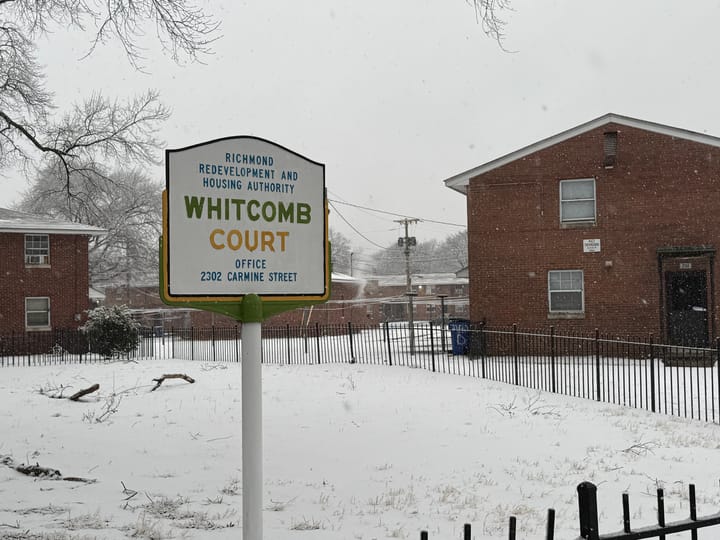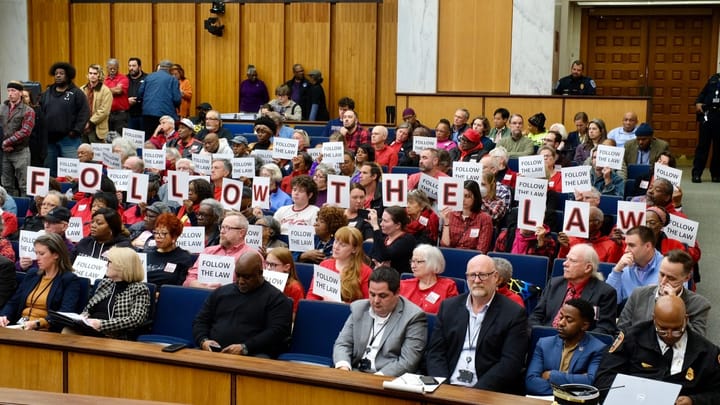
In Richmond transparency lawsuit, bills from private law firm stopped months ago
To track what a high-profile lawsuit about government transparency is costing the city of Richmond, activists and journalists have been filing Freedom of Information Act requests for billing invoices filed by private law firm Ogletree Deakins.
However, the firm has gone roughly four months without filing a new invoice, making it impossible for outsiders to use those documents to monitor how the costs to the city are adding up.
The missing invoices mean that — at least for now — officials can’t provide an up-to-date number for how much the city is spending to fight a lawsuit claiming there’s been a lack of transparency at City Hall.
It’s unclear if city officials themselves know how high the bill might already be for the outside firm handling the lawsuit filed by former city FOIA officer Connie Clay, who claims she was wrongfully fired for insisting that the city follow public-records laws.
As of mid-September, the city said it had spent $234,711.35 on the case. But that amount only reflects expenses for legal work Ogletree had billed for as of May 31, and doesn’t cover extensive legal work over the summer to prepare for a now-postponed September trial.
Both lead Ogletree attorney Jimmy F. Robinson Jr. and the city attorney’s office say the lack of timely invoices was caused by a technical issue on the law firm’s end.
Nevertheless, because Robinson has objected to public scrutiny of the bills he’s filed for his work on the case, the invoice stoppage has raised suspicions among some following the case.
Without invoices being filed, there’s no longer a complete paper trail allowing journalists and others to keep track of the city’s costs.
“My impression and experience with lawyers is that the one thing they always do and the one system that never fails is their ability to bill their clients. I find this highly suspicious,” said Josh Stanfield, a progressive activist who has filed requests for invoices submitted after May and was surprised to be told none existed.
Robinson’s previous invoices were marked “PERSONAL AND CONFIDENTIAL,” even though the city has to release them as public records detailing how public money is spent.

‘That is the sole reason’
Robinson says the invoice stoppage wasn’t intentional, and was instead a technical issue that he’s working to resolve.
“I have not sent invoices to any of my clients since May because of an internal administrative issue associated with my billing apparatus,” Robinson said in a Sept. 23 email to The Richmonder. “That is the sole reason.”
Asked if he could elaborate on what the billing problem is, Robinson declined to comment further.
“Of course, we want to get paid, and we are actively working to resolve the billing issue now,” he said. “But there is no strategy, no conspiracy, and nothing that the city was even aware of until we began to address it. If anything, I owe the city an apology for the delay, just as I do to all of my clients.”
The monthslong gap in invoices doesn’t align with the agreement Robinson made to defend the city in the Clay lawsuit. The invoices are supposed to be filed on a monthly basis, according to a 2024 engagement letter with Ogletree.
On Tuesday, City Attorney Laura Drewry said she expects the problem with Ogletree’s invoices to be resolved shortly and for bills to be filed “in the near future.”
“The city is confident that when Ogletree provides its invoices, they will reflect the detail and information outlined in the engagement letter,” Drewry said in an email. “Attorneys are ethically required to maintain accurate billing records, and like always, we fully expect the invoices to meet those standards.”
The two sides agreed to a $470 hourly rate for Robinson for his work on the case. Associates at the firm can bill at $385 per hour for work on the city’s case, and paralegals can charge $150. The agreement says those rates are discounted from Ogletree’s regular rates “because of the public interest considerations.”
Robinson’s agreement with the city said that, for billing purposes, his firm’s time spent on the case should be broken down to “tenths of an hour,” giving the city attorney’s office a high level of insight into the firm’s work. Without invoices, it’s not clear what kind of updates the city has been getting about the time and resources spent on a high-profile case that could span several years.
The lawsuit was filed in March of 2024, shortly after Clay was let go from her city job that January.
Clay claims she was wrongfully fired for engaging in protected whistleblower activity by calling out the city’s repeated failures to comply with FOIA laws requiring most government documents to be available to the public. The city’s team says she was let go for being a combative employee who didn’t fit in the role.
Clay is being represented by employment attorney Sarah Robb, who has repeatedly clashed with Robinson over scheduling matters and disagreements over whether the city is complying with requests to hand over documents and make witnesses available for questioning.
The Richmonder is powered by your donations. For just $9.99 a month, you can join the 1,000+ donors who are keeping quality local journalism alive in Richmond.
Trial delay renews focus on costs
The potential costs of the litigation, which was filed in early 2024, took on new relevance last month.
Just before a three-day jury trial was about to begin, Richmond Circuit Court Judge Claire G. Cardwell called off the trial, saying there were too many unresolved disputes between the lawyers to allow the case to proceed as planned. The judge rescheduled the trial for June of 2026, which means the city could be looking at another nine months of bills for Ogletree’s work on the case.
It’s unclear if the city has any intention of settling the case, but the lack of timely invoices could complicate the city’s cost-benefit analysis of continuing the court battle versus paying Clay to end the dispute and move on.
The judge overseeing the case recently ordered the city’s lawyer to conduct additional searches for documents relevant to Clay’s firing. The city’s team has argued Clay should have to cover some of the costs of those searches, but the judge said she wasn’t inclined to make Clay foot the bill.
Who’s responsible for dragging out an increasingly expensive and time-consuming lawsuit has been a point of contention in the case. Clay’s attorneys have accused the city’s lawyers of using stall tactics and blocking their ability to get full access to evidence related to Clay’s claims. The city’s representatives, meanwhile, have accused Clay’s team of wasting public resources by turning the case into a never-ending battle over documents with little relevance to the lawsuit.
Clay herself has filed FOIA requests for Ogletree’s invoices, a development Robinson denounced in one court filing as an “abuse of public information channels for private litigation gain.”
Though the agreement with Robinson notes that the high-level billing invoices he files with the city would likely be released under FOIA, Robinson has argued the focus on his invoices is part of a pattern of Clay stirring up negative coverage of the city. Clay’s attorneys have disputed that claim, saying the invoices are public documents available to anyone who asks for them.
Robinson also accused Clay of “leaking incorrect information to the news media,” an assertion that drew similar pushback from Clay’s team.
Mayor Danny Avula declined to weigh in on the latest twists and turns in the lawsuit, but offered a statement reaffirming his “commitment to making information more accessible and transparent for the public.”
“Due to pending litigation, I cannot comment on the specifics of the case or the attorneys’ legal strategy, but I very much want the situation resolved in the best interest of the city as quickly as possible,” Avula said. “I understand there is strong public interest in the specifics, and the attorneys are in a better position to respond to questions. In time, I intend that more details will be shared.”
Contact Reporter Graham Moomaw at gmoomaw@richmonder.org
The Richmonder is powered by your donations. For just $9.99 a month, you can join the 1,000+ donors who are keeping quality local journalism alive in Richmond.







